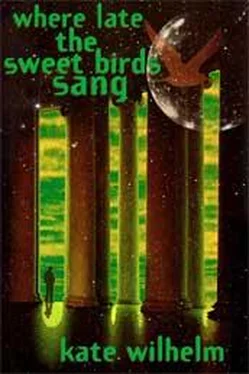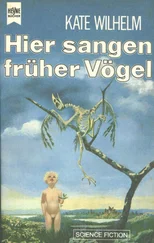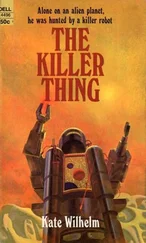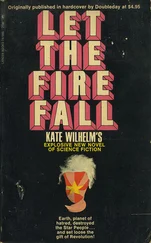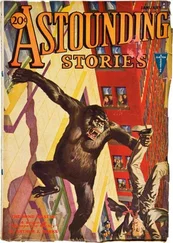They worked and slept in the lab, leaving only for meals. The winter rains gave way to spring rains, and a new softness was in the air.
David was leaving the cafeteria, his mind on the work in the lab, when he felt a tug on his arm. It was his mother. He hadn’t seen her for weeks, and would have brushed past her with a quick hello if she hadn’t stopped him. She looked strange, childlike. He turned from her to stare out the window, waiting for her to release his arm.
“Celia’s coming home,” she said softly. “She’s well, she says.”
David felt frozen; he continued to stare out the window seeing nothing. “Where is she now?” He listened to the rustle of cheap paper and when it seemed that his mother was not going to answer him, he wheeled about. “Where is she?”
“Miami,” she said finally, after scanning the two pages. “It’s postmarked Miami, I think. It’s over two weeks old. Dated May 28. She never got any of our mail.” She pressed the letter into David’s hand. Tears overflowed her eyes, and heedless of them she walked away.
David didn’t read the letter until his mother had left the cafeteria. I was in Colombia for a while, eight months, I think. And I got a touch of the bug that nobody wants to name. The writing was spindly and uncertain. She was not well then. He looked for Walt.
“I have to go get her. She can’t walk in on that gang at the Wiston place.”
“You know you can’t leave now.”
“It isn’t a question of can or can’t. I have to.”
Walt studied him for a moment, then shrugged. “How will you get there and back? No gas. You know we don’t dare use any for anything but the harvest.”
“I know,” David said impatiently. “I’ll take Mike and the cart. I can stay on the back roads with Mike.” He knew that Walt was calculating, as he had done, the time involved, and he felt his face tightening, his hands clenching. Walt simply nodded. “I’ll leave as soon as it’s light in the morning.” Again Walt nodded. “Thanks,” David said suddenly. He meant for not arguing with him, for not pointing out what both already knew — that there was no way of knowing how long he would have to wait for Celia, that she might never make it to the farm.
Three miles from the Wiston farm, David unhitched the cart and hid it in thick underbrush. He swept over the tracks where he had left the dirt road, and then led Mike into the woods. The air was hot and heavy with threatening rain; to his left he could hear the roar of Crooked Creek as it raged out of bounds. The ground was spongy and he walked carefully, not wanting to sink to his knees in the treacherous mud here in the lowlands. The Wiston farm always had been flood-prone; it enriched the soil, Grandfather Wiston had claimed, not willing to damn nature for its periodic rampages. “God didn’t mean for this piece of ground to have to bear year after year after year,” he said. “Comes a time when the earth needs a rest, same as you and me. We’ll let it be this year, give it some clover when the ground dries out.”
David started to climb, still leading Mike, who whinnied softly at him now and again. “Just to the knob, boy,” David said quietly. “Then you can rest and eat meadow grass until she gets here.”
Grandfather Wiston had taken him to the knob once, when David was twelve. He remembered the day, hot and still like this day, he thought, and Grandfather Wiston had been straight and strong. At the knob his grandfather had paused and touched the massive bole of a white oak tree. “This tree saw the Indians in that valley, David, and the first settlers, and my great-grandfather when he came along. It’s our friend, David. It knows all the family secrets.”
“Is it still your property up here, Grandfather?”
“Up to and including this tree, son. Other side’s national forest land, but this tree, it’s on our land. Yours too, David. One day you’ll come up here and put your hand on this tree and you’ll know it’s your friend, just like it’s been my friend all my life. God help us all if anyone ever lays an ax to it.”
They had gone on that day, down the other side of the knob, then up again, farther and steeper this time until once more his grandfather paused for a few moments, his hand on David’s shoulder. “This is how this land looked a million years ago, David.” Time had shifted suddenly for the boy; a million years, a hundred million, was all the same distant past, and he imagined the tread of the giant reptiles. He imagined that he smelled the fetid breath of a tyrannosaur. It was cool and misty under the tall trees, and below them the saplings grew, with their branches spread horizontally, as if to catch any stray bit of sunlight that penetrated the high canopy. Where the sun did find a path through, it was golden and soft, the sun of another time. In even deeper shadows grew bushes and shrubs, and at the foot of it all were the mosses and lichens, liverworts and ferns. The arching, heaving roots of the trees were clothed in velvet emerald plants.
David stumbled and, catching his balance, came to rest against the giant oak tree that was, somehow, his friend. He pressed his cheek against the rough bark for a few moments, then he pushed himself away and looked up through the luxuriant branches; he could see no sky through them. When it rained, the tree would protect him from the full force of the storm, but he needed shelter from the fine drops that would make their way through the leaves to fall quietly on the absorbent ground.
Before he started to build a lean-to, he examined the farm through his binoculars. Behind the house, there was a garden being tended by five people; impossible to tell if they were male or female. Long-haired, jeans, barefoot, thin. It didn't matter. He noted that the garden was not producing yet, that the plants were sparse and frail. He studied the east field, aware that it was changed but not certain what was different. Then he realized that it was growing corn. Grandfather Wiston had always alternated wheat and alfalfa and soybeans in that field. The lower fields were flooded, and the north field was grown up in grasses and weeds. He swept the glasses slowly over the buildings. He spotted seventeen people altogether. No child younger than eight or nine. No sign of Celia, nor of any recent use of the road, which was also grown up with weeds. No doubt the people down there were just as happy to let the road hide under weeds.
He built a lean-to against the oak, where he could lie down and observe the farm. He used fir branches to roof the shelter, and when the storm came half an hour later he stayed dry. Rivulets ran among the garden rows below, and the farmyard turned silver and sparkly from this distance, although he knew that closer it would simply be muddy water inches deep. The ground was too saturated in the valley to absorb any more water. It would have to run off into Crooked Creek, which was inching higher and higher toward the north field and the vulnerable corn there.
By the third day the water had started to invade the cornfield, and he pitied the people who stood and watched helplessly. The garden was still being tended, but it would be a meager harvest. By now he had counted twenty-two people; he thought that was all of them. During the storm that lashed the valley that afternoon, he heard Mike whinny and he crawled from the lean-to and stood up. Mike, down the slope of the knob, wouldn’t mind the rain too much, and he was protected from the wind. Still, he whinnied again, and then again. Cautiously, holding his shotgun in one hand, shielding his eyes from the lashing rain with the other, David edged around the tree. A figure stumbled up the knob haltingly, head bowed, stopping often, then moving on again, not looking up, probably blinded by the rain. Suddenly David threw the shotgun under the lean-to and ran to meet her. “Celia!” he cried. “Celia!”
Читать дальше
